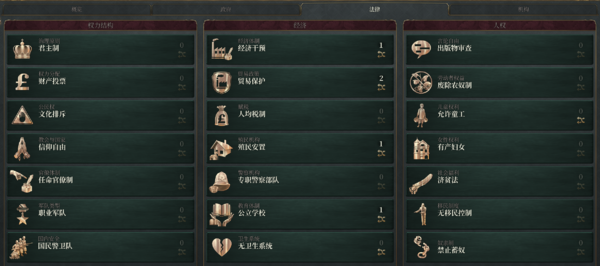(→国内安全) |
小 (→治理原则) |
||
| 第348行: | 第348行: | ||
{| class="mildtable sortable plainlist" width=100% | {| class="mildtable sortable plainlist" width=100% | ||
! width=30% | 法律 | ! width=30% | 法律 | ||
! width=20% | | ! width=20% | 需求 | ||
! class="unsortable" width=30%" | 修正 | ! class="unsortable" width=30%" | 修正 | ||
! width=20% | 是否存在改变限制 | ! width=20% | 是否存在改变限制 | ||
| 第364行: | 第364行: | ||
* {{icon|Legitimacy}} {{green|+20}} 来自政府中包括国家元首的合法性 | * {{icon|Legitimacy}} {{green|+20}} 来自政府中包括国家元首的合法性 | ||
* {{icon|Landowners}} '''+25%''' 地主政治力量 | * {{icon|Landowners}} '''+25%''' 地主政治力量 | ||
| | | 无 | ||
|- id="总统共和制" | |- id="总统共和制" | ||
| 第372行: | 第372行: | ||
* {{icon|Legitimacy}} {{green|+15}} 来自政府中包括国家元首的合法性 | * {{icon|Legitimacy}} {{green|+15}} 来自政府中包括国家元首的合法性 | ||
* {{icon|Legitimacy}} {{green|+0.25}} 执政团体势力产生的合法性 | * {{icon|Legitimacy}} {{green|+0.25}} 执政团体势力产生的合法性 | ||
| | | 无 | ||
|- id="议会共和制" | |- id="议会共和制" | ||
| 第380行: | 第380行: | ||
* {{icon|Legitimacy}} {{green|+0.2}} 执政团体势力产生的合法性 | * {{icon|Legitimacy}} {{green|+0.2}} 执政团体势力产生的合法性 | ||
* {{icon|Legitimacy}} {{green|−0.3}} 减少政府规模带来的合法性惩罚 | * {{icon|Legitimacy}} {{green|−0.3}} 减少政府规模带来的合法性惩罚 | ||
| | | 无 | ||
|- id="神权制" | |- id="神权制" | ||
| 第388行: | 第388行: | ||
* {{icon|Legitimacy}} {{green|+20}} 来自政府中包括国家元首的合法性 | * {{icon|Legitimacy}} {{green|+20}} 来自政府中包括国家元首的合法性 | ||
* {{icon|Devout}} '''+25%''' 虔信者政治力量 | * {{icon|Devout}} '''+25%''' 虔信者政治力量 | ||
| | | 无 | ||
|- id="委员会共和制" | |- id="委员会共和制" | ||
| 第397行: | 第397行: | ||
* {{icon|Farmers}} '''+25%''' 农民政治力量 | * {{icon|Farmers}} '''+25%''' 农民政治力量 | ||
* {{icon|Machinists}} '''+25%''' 技工政治力量 | * {{icon|Machinists}} '''+25%''' 技工政治力量 | ||
| | | 无 | ||
|} | |} | ||
2022年10月30日 (日) 15:54的版本
- 参见:法律
权力结构法律决定方方面面国家事物中何者居于统治地位。
It includes fundamental Governance Principles such as monarchy and parliamentary republic, which determine who will be the nation's head of state is and what kind of powers they wield.
Distribution of Power ranges from autocracy and oligarchy through various extensions of the voting franchise all the way to universal suffrage.
Citizenship and Church and State laws govern which pops suffer legal discrimination in the country due to their culture or religion.
The principles on which Bureaucracy is run -- such as hereditary or elected positions for bureaucrats -- determine how expensive it is to keep track of each citizen and how much institutions cost to run, but also directly benefit some groups over others.
Conscription lets the player raise a part of the civilian workforce as soldiers in times of war, and Internal Security governs how the home affairs anti-insurgent institution works.
军队类型
军队的组织和管理方式。
| 法律 | 解锁科技 | 修正 | 是否存在改变限制 |
|---|---|---|---|
|
没有限制 | ||
| 没有限制 | |||
| 没有限制 | |||
| 没有限制 |
官僚体制
如何管理你的国家。
| 法律 | 解锁科技 | 修正 | 是否存在改变限制 |
|---|---|---|---|
教会与国家
身体的统治者与精神的统治者之间的关系。
| 法律 | 解锁科技 | 修正 | 改变限制? | 立场 |
|---|---|---|---|---|
| AAA | ||||
| AAA | ||||
|
AAA |
公民权
扩展公民权。
| 法律 | 解锁科技 | 修正 | 是否存在改变限制 |
|---|---|---|---|
|
|||
权力分配
政治权力是如何被分配的。这决定国家元首对谁负责。
| 法律 | 解锁科技 | 修正 | 是否存在改变限制 |
|---|---|---|---|
|
|||
治理原则
国家治理的基本原则与权威。决定了什么人是国家元首。
| 法律 | 需求 | 修正 | 是否存在改变限制 |
|---|---|---|---|
| 仅NPC可用 | |||
| 无 | |||
| 无 | |||
| 无 | |||
| 无 | |||
| 无 |
国内安全
保持国内有序。
| 法律 | 科技需求 | 修正 | 是否存在改变限制 |
|---|---|---|---|
| 无 | 无 | 无 | |
| 无 | |||
| 无 | |||
| 无 |

































